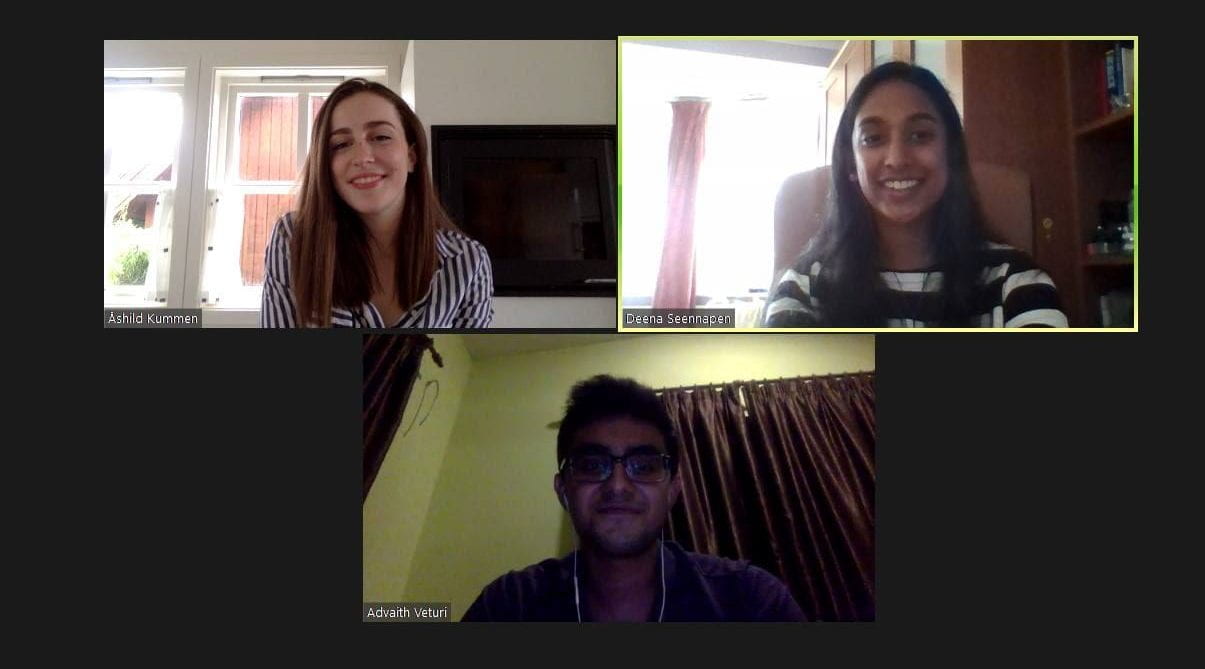The COVID-19 pandemic has had a devastating impact on society and the economy, causing a dramatic loss of human life globally and an increased burden on public health systems, food systems and various other industries. Recovering from effects of the pandemic and taking the first steps toward a more resilient and equitable future, is one of the most pressing issues facing humanity.
During July 2020, two of my close friends, Deena Seenapen, Ashild Kummen and myself took part in, and came second place in the “COVID-19 Recovery Challenge” competition organized by the UCL Faculty of Medicine and UCL Innovation and Enterprise. This competition was an amazing opportunity for us to participate in developing an innovative solution for mitigating the negative effects of the pandemic. Specifically, the rules were to present a 3-minute pitch video and a project proposal which would be evaluated by a panel of experts. Given our collective passion for technology, we decided to focus on the issue of hospital management during the pandemic, using methods derived from data science and AI – a project we called “TRAVERSE”.
Team Traverse
Just briefly describing Traverse – we learnt through initial research that despite all the protective measures like PPE and the social distancing regulations, around a 5th of patients in hospitals in the UK contracted the COVID illness while being treated for another illness. This was due to incoming visitors bringing the infection from outside and spread within the hospital itself. This could spark fear in visitors to avoid hospitals as they aren’t safe, especially those who needed to come in for regular checkups. Considering this problem, our vision was to reduce the COVID admissions and create a safer environment by developing an in-hospital real-time tracking system. Specifically, our proposal was to setup a pilot study where each patient and visitor would be provided with a radiofrequency ID (RFID) tag (a small electronic chip that can be worn as a wristband). Within different areas of the hospital, sensors would be placed so that every time a person crosses into a specific zone, the sensor (via the RFID tag) would collect the information of where the person has been. Using this data, modelling softwares such as graphical models could be implemented, whereby if someone acquired the COVID infection, we could look backward in time in the graph and use the tracking data to determine probabilities of surrounding individuals acquiring the infection as well.
I would wholeheartedly like to thank my mentor, Dr. Rebecca Pope, who is the Head of Data Science and Engineering at KPMG UK, for helping us solidify and formulate the idea. From our discussions, we learnt that such a software was already developed and prototyped by KPMG UK and our proposal was to connect with the team and integrate this technology into the hospitals. This would really help hospital staff understand where distancing regulations need to be strictly enforced and who all are at risk of acquiring an infection.
Here is the 3 minute pitch video that we shared for the competition – a big shout-out to Ashild who did an amazing job at producing this!
This competition has been a great learning experience for me personally. Firstly, I must confess that before it had even started, I thought of quitting as I felt unprepared and assumed that most people participating would have applied with fully-planned ideas and solutions. But thankfully, I was part of a great team and we all played to our strengths and supported each other. Furthermore, during the 2 weeks of the competition, I had the opportunity to listen to talks and receive mentoring from experts in various fields like business, healthcare, public policy, economics and other areas. Having always been focused on the medical science and technology, I would say that interacting with the experts allowed me to temporarily disconnect from what I know and consider other perspectives on the pandemic, which were really inspiring and interesting to learn about.
Secondly, being really passionate about a career in technology, this competition was an eye-opener as it helped me appreciate the amount of hard work that goes into software development. Writing code is just one small part of the process, there is additional work such as setting up full pipeline, deciding how to allocate resources and create a budget. Especially with a data science project, there needs to be planning in terms of partnering with the hospital/company, collecting the data, ensuring data ethics and privacy concerns are addressed, setting up a pilot study, setting up discussions with doctors and hospital staff – the list goes on an on! Just reflecting our planning process, I realize that we spent too much time focusing on the idea and the technology itself, which was because the goal of the competition was just to produce a pitch/proposal of the idea. However if I were to go back and make a change to our strategy, one thing I would’ve done is spent more time with our mentors and experts on understanding further about how to plan the budgets, how to collect the data, basically all the logistics-related work.
Either way, this has been a great experience for us in the Traverse team, and we hope to participate in more fun competitions like this and further refine our ideas, so that this vision will become a reality!
